Digital Asset Index Funds: A New Gateway for Conservative Investors
In the rapidly evolving world of finance, digital assets—particularly cryptocurrencies—have emerged as a disruptive force, challenging traditional investment norms. Once considered the playground of speculative traders and tech-savvy early adopters, the digital asset market is now attracting a broader class of investors. Among the most intriguing developments is the rise of Digital Asset Index Funds, which are emerging as a compelling option for conservative investors seeking measured exposure to this burgeoning asset class.
Understanding Digital Asset Index Funds
Digital Asset Index Funds are investment vehicles that track the performance of a diversified basket of cryptocurrencies or blockchain-related assets, similar to how traditional index funds might follow the S&P 500 or NASDAQ. These funds are often passively managed and aim to reduce the volatility and risk associated with individual digital tokens by offering exposure to a range of them in a single package.
For example, a typical crypto index fund might include allocations to Bitcoin, Ethereum, and other established altcoins, balancing the portfolio to mitigate the impact of extreme price swings in any one asset. Some may also incorporate emerging tokens or blockchain equities, depending on the fund’s objective and strategy.
Why Conservative Investors Are Taking Notice
Traditionally, conservative investors have shied away from cryptocurrencies due to their volatility, lack of regulation, and perceived association with speculation. However, the investment landscape is changing, and so are the attitudes of risk-averse investors. There are several reasons why digital asset index funds are becoming an increasingly attractive gateway into the crypto market:
1. Diversification and Risk Mitigation
Index funds inherently provide diversification—a key principle in conservative investing. By spreading investments across a variety of digital assets, these funds reduce the exposure to the potential collapse of any single coin. This diversification helps cushion the impact of market fluctuations, offering a more stable return profile over time.
2. Professional Management and Transparency
Most digital asset index funds are managed by experienced investment firms that provide regular performance reporting, rebalancing strategies, and transparent fee structures. This level of professional oversight offers a degree of security and reliability that appeals to conservative investors who prefer managed solutions over DIY trading.
3. Institutional Adoption and Legitimacy
The increasing institutional adoption of digital assets has played a crucial role in shifting perceptions. Major financial institutions such as Fidelity, BlackRock, and Goldman Sachs have begun offering crypto-related services and products. Their involvement lends credibility to the sector, making conservative investors more comfortable with the idea of indirect exposure through regulated fund structures.
4. Regulatory Advances
While regulatory clarity around cryptocurrencies remains a work in progress, strides have been made in various jurisdictions to create a safer and more predictable environment for investors. The approval of Bitcoin ETFs in several countries and the emergence of licensed digital asset custodians are steps in the right direction, reassuring conservative investors that the market is maturing.
Key Benefits of Digital Asset Index Funds
In addition to offering a gentler entry point into digital assets, index funds bring several practical benefits:
- Lower Volatility: While crypto remains volatile compared to traditional markets, index funds help to smooth out the wild swings of individual tokens.
- Accessibility: Many digital asset index funds are available through traditional brokerage platforms, retirement accounts, or fintech apps, making them accessible without the need for wallets, private keys, or deep technical knowledge.
- Cost-Efficiency: Passive index strategies generally have lower management fees compared to actively managed crypto funds, which appeals to fee-conscious conservative investors.
Potential Risks to Consider
Despite their advantages, digital asset index funds are not without risks. It’s important for conservative investors to understand the following before diving in:
- Market Volatility: Even diversified funds cannot eliminate crypto market volatility. Sudden regulatory changes, security breaches, or macroeconomic shocks can still impact overall performance.
- Custodial Risk: Although many funds work with reputable custodians, the digital asset space is still vulnerable to cyber threats and technological failures.
- Lack of Historical Data: Unlike stock market indices with decades of data, crypto index funds are relatively new, which limits the ability to assess long-term performance trends.
Choosing the Right Fund
For conservative investors interested in exploring digital asset index funds, due diligence is crucial. Factors to consider include:
- Fund Composition: Understand which assets are included and how frequently the fund is rebalanced.
- Fees and Expenses: Compare management fees, trading costs, and potential hidden charges.
- Regulatory Compliance: Prefer funds registered with financial authorities or offered through reputable institutions.
- Track Record: Although limited, some funds have been around long enough to demonstrate performance through different market cycles.
Conclusion: A Balanced Approach to Innovation
Digital asset index funds represent a significant step forward in the integration of cryptocurrencies into mainstream finance. For conservative investors who have been cautious about entering the crypto space, these funds offer a more secure and manageable pathway. By emphasizing diversification, professional management, and transparency, digital asset index funds provide a balanced approach to participating in one of the most innovative sectors of the modern economy.
As with any investment, due diligence, education, and alignment with individual risk tolerance are essential. But for those seeking exposure to digital assets without the rollercoaster of direct trading, index funds might just be the right way to start.




Post Comment